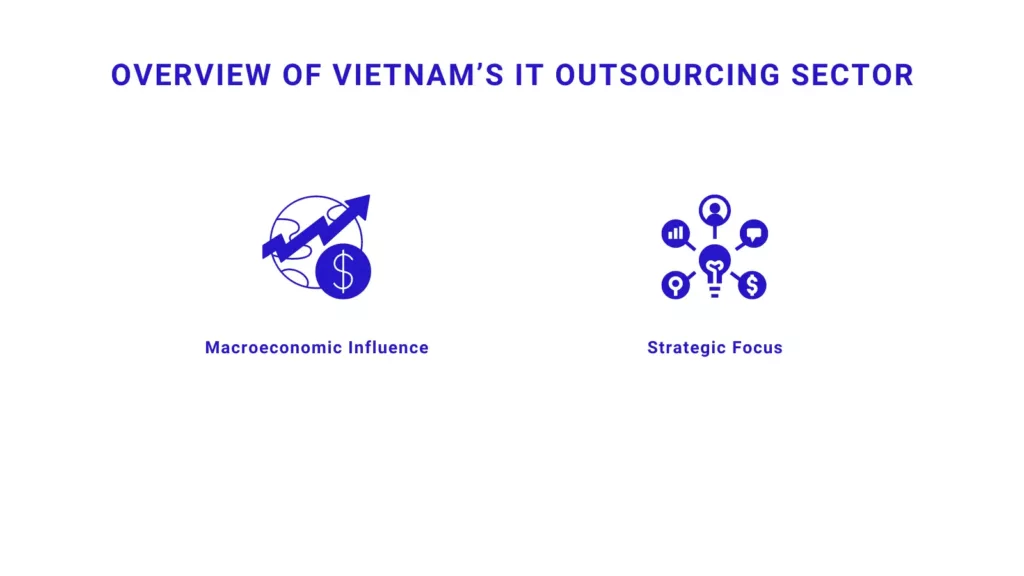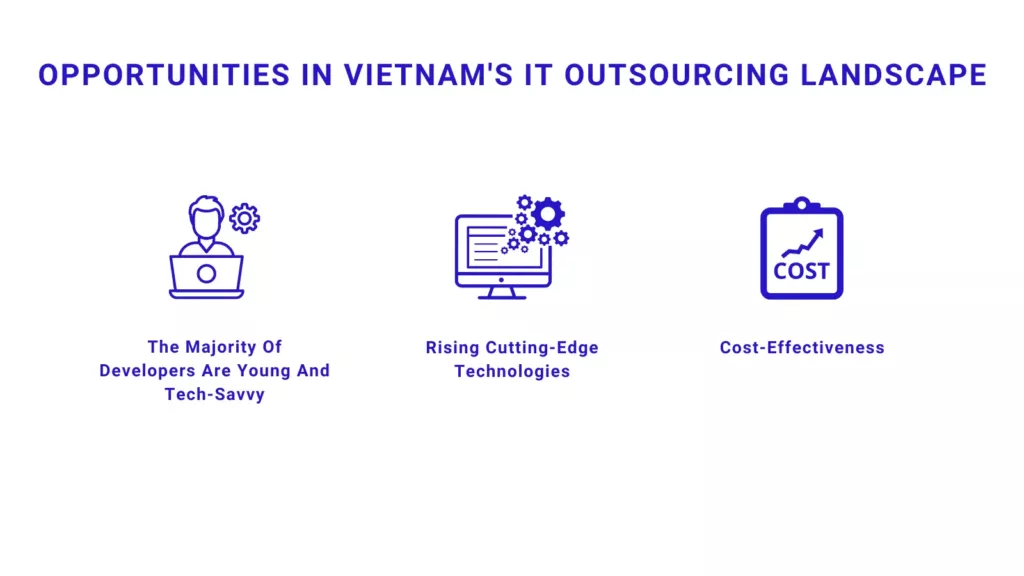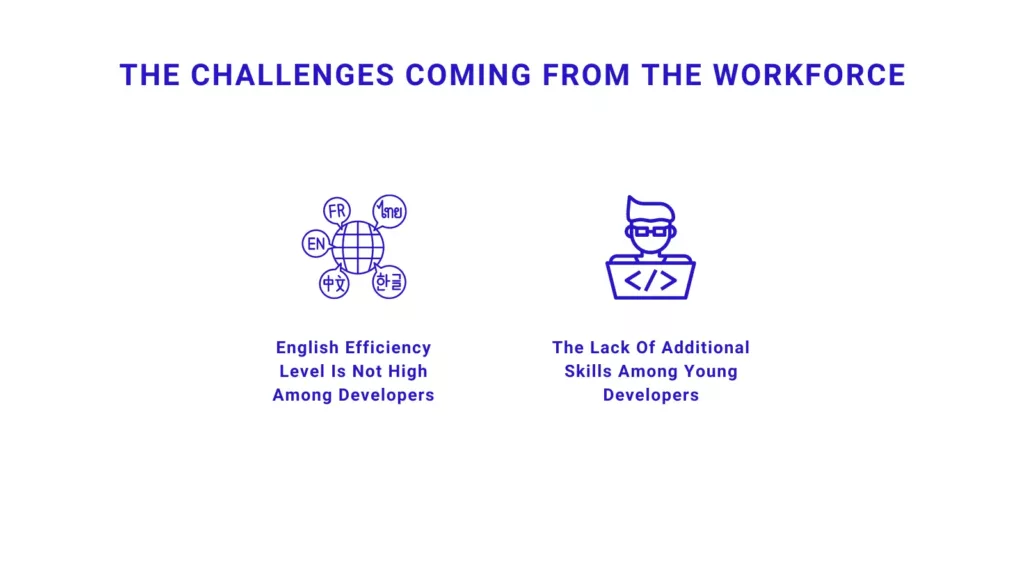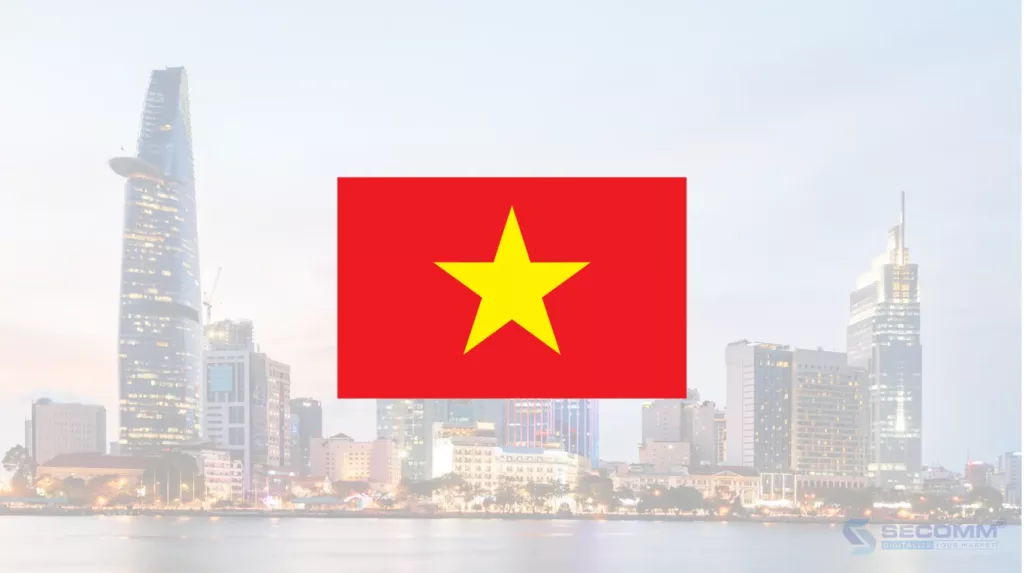It seems we can’t find what you’re looking for. Perhaps searching can help.


Tag: IT





IT Outsourcing in Vietnam: Benefits and Challenges
IT outsourcing has become a prevalent strategy in today’s business landscape, offering several advantages such as cost savings, access to specialized expertise, and operational agility. For years, Vietnam has stood out as a prime destination for IT outsourcing due to its favorable business ecosystem, competitive labor costs, and government support.
In this blog post, SECOMM explores why Vietnam is an ideal choice for businesses seeking to outsource their IT requirements. We’ll delve into the country’s strengths and potential drawbacks, providing valuable insights for decision-makers.
1. Overview of Vietnam’s IT Outsourcing Sector
Vietnam’s dedication to advancing science and technology has led to a flourishing ICT market, valued at $7.7 billion in 2021, with ongoing growth fueled by digital adoption in both the public and private sectors.
Macroeconomic Influence: Vietnam has emerged as one of the fastest-growing economies globally, buoyed by a stable political environment and government support for the IT industry. Furthermore, rising investments in cutting-edge technology and startup funding fuel the market’s expansion.
Strategic Focus: According to the International Trade Administration, the Vietnamese government recognizes Information and Communication Technology (ICT) as a pivotal industry and a driver of socio-economic progress. Additionally, Vietnam’s commitment to core tech advancements is evident through significant investments in AI and cloud computing by the government and major companies.
Due to the above elements, the IT outsourcing industry in Vietnam is growing rapidly with an impressive annual growth rate of 16.38% from 2024 to 2028, resulting in a substantial market volume of US$1,282.00 million by 2028.
2. Evaluating Opportunities and Challenges
A. Opportunities in Vietnam’s IT Outsourcing Landscape
The Majority Of Developers Are Young And Tech-Savvy
Around 56% of developers fall within the 20 – 29 years age group, this number is expected to form about one-third of Vietnam’s workforce by 2025.
There are approximately 50,000 to 57,000 students who graduate in university IT programs annually. Due to this, Vietnam was ranked among the top 10 globally for IT graduates and the top 6 for quality software services. TopDev’s 2023 report highlights that Vietnam’s robust community of around 530,000 tech professionals is well-suited to meet the varied demands of international businesses.
Moreover, the Ministry of Education and Training manages IT education in Vietnam. Recent changes have allowed more flexibility in higher education institutions to encourage innovation. For instance, separate entrance exams for each institution have been eliminated, resulting in improved admission rates.
Rising Cutting-Edge Technologies
Cloud computing in Vietnam has grown at a 30% CAGR recently, driven by robust IT infrastructure and data centers. This progress aligns with Vietnam’s digital transformation agenda. Moreover, with the aim of data security, many Vietnamese companies prefer “make in Vietnam” cloud computing services to foreign ones.
Vietnam has also made strides in artificial intelligence readiness, moving from 55th to 39th globally. It ranks 9th in East Asia and 5th in ASEAN, with an AI readiness score of 54.48.
Cost-Effectiveness
In 2023, the average monthly salary for developers with fresher-level salaries at $514 and for director-level salaries at $2,680. Overall, the annual salary of a Vietnamese IT developer is $7,173, which is incredibly low, it only amounts to nearly 25% of Chinese wages ($29.840) and around 35% of Indian wages ($20.464). These cost benefits, coupled with a commitment to high-quality workflows, are making Vietnam an increasingly popular choice for international organizations seeking dependable and affordable IT services.
B. The Challenges Coming From The Workforce
English Efficiency Level Is Not High Among Developers
The IT sector’s language requirements are becoming stricter, with over 9% of foreign companies seeking IT staff with professional English skills. The demand for English proficiency has shifted from a nice-to-have to a must-have. Although Vietnamese tech professionals have strong technical abilities and can communicate effectively, their English-speaking skills may not be as advanced as those in other ASEAN countries.
In 2022, only 5% of Vietnam’s workforce was fluent in English, which is less than the fluency rates in Indonesia (10%), Malaysia (21%), and Thailand (27%). This has caused a challenge in the recruitment process for IT outsourcing that many skilled developers are getting denied due to their English level.
The Lack Of Additional Skills Among Young Developers
Additionally, the new generation of developers, mainly Gen Z, is experiencing a growing skills gap because of the fast-paced technological changes. Yet, an impressive 72% of them are keen to learn digital skills, which is higher than the global average of 52%. This enthusiasm is a positive sign for the future, showing they understand the challenges and are ready to tackle them.
Upon engaging with SECOMM, you will gain access to a dedicated IT team that meets standards in English proficiency and technical competency. Book your FREE consultation with SECOMM’s experts today.
Explore SECOMM’s project: Assembling a Specialized Vietnamese IT Team for LandNow’s Website Development.
3. To Sum Up!
Vietnam’s IT outsourcing market has seen consistent growth, thanks to significant investments from both the government and foreign companies. If you’re seeking an IT team provider in Vietnam, consider SECOMM. Their exceptional talent can drive innovation and elevate your business objectives. Reach out to SECOMM at (+84) 28 7108 9908 to explore a partnership.
 2
2

 131
131

 0
0

 1
1

Top 10 IT Outsourcing Countries In 2024
With the economic challenges post-COVID-19, IT outsourcing has become a go-to solution for businesses aiming to use their budgets effectively. They’re partnering with outsourcing companies for IT tasks instead of solely depending on in-house teams.
Meanwhile, the IT sector is rapidly growing, fueled by ongoing tech advancements. Outsourcing is crucial to this growth, which is expected to soar to USD 525.2 billion by 2030, growing at a CAGR of 9.4% from 2023 to 2030. This points to a sustained high demand for IT outsourcing well into the decade.
When considering outsourcing software tasks, it’s crucial to identify the best countries for the job. The ideal locations are those that excel in technological expertise, offer favorable business environments, lead in innovation, and have strong English language proficiency. The following list will highlight the top 10 countries with stand-out IT dedicated teams that could be considered prime choices for IT outsourcing services.
1. India
India has consistently been at the forefront of the outsourcing sector and is renowned for its extensive pool of IT and software development talent. The country’s cost-effective services, proficiency in English, and solid tech infrastructure have established it as a preferred choice for global businesses. With more than 1.5 million IT graduates each year, India ensures a continuous influx of skilled professionals to satisfy the increasing demands of the outsourcing market in Asia.
Moreover, India’s cost structure is generally more affordable than Western countries, making it an attractive option for companies looking to outsource development tasks. For instance, according to Upwork, software developers in India typically charge between $18 and $39 per hour, which is significantly lower than the $50 to $60 per hour rate in the United States or Germany, with the average rate from $150 to $250 per hour. This combination of a large, skilled workforce and competitive pricing positions India favorably against other leading IT outsourcing destinations.
2. China
Just like India, China’s massive talent pool and diverse skill set make it one of the best countries for outsourcing, and it has emerged as an IT outsourcing power dominating the labor market. With an education system that promotes Math and Science, China provides some of the world’s best technology and IT services.
In terms of talent pool, China is one of the largest producers of IT graduates worldwide, boasting over 3 million IT graduates a year (this number is quite significant compared to India due to its large population). This vast number of highly educated and skilled individuals further solidifies China’s position as a desirable destination for outsourcing.
Additionally, the Chinese government actively supports IT development and invests in education to build a strong talent base. It focuses on advancing STEM (science, technology, engineering, and mathematics) education, which is essential for the IT sector. This approach improves learning in science and math, which is foundational for IT expertise.
In 2024, China remains a competitive choice for outsourcing, with an average IT outsourcing salary of about $20-$45 an hour, striking a balance between cost-effectiveness and quality output. This affordable rate and the country’s commitment to technological advancement make China an appealing choice for businesses worldwide.
3. Philippines
The Philippines is a sought-after hub for software development outsourcing and BPO is favored for its cost-effective labor and proficient workforce. English is the official language, simplifying communication and aligning with the country’s strong cultural connections to the US. This understanding of Western work culture is a significant advantage, especially since 94% of the population speaks English.
With around 190,000 developers stationed in key BPO centres like Manila, Cebu, Davao, and Bacolod, the Philippines is recognized as a leading IT outsourcing hub, especially in the healthcare and fintech sectors.
The educational system in the Philippines annually produces approximately 200,000 IT graduates, emphasizing IT and technical skills to create an adaptable and globally competitive workforce. In 2024, the average IT outsourcing salary stood at around $20-$60 an hour, affirming the Philippines’ position as one of the most economical offshore outsourcing destinations.
4. Brazil
Similar to the Philippines, Brazil shares cultural affinities with the US, which translates into high-quality IT services at competitive rates. This cultural resonance, coupled with its strategic location, makes Brazil a preferred partner for North American IT firms.
Brazil’s commitment to building a skilled tech workforce is reflected in the production of about 150,000 IT graduates each year. The government’s efforts to perfect the technological education infrastructure set Brazil apart as a top destination for offshore software development.
Although Brazil’s outsourcing costs are slightly high, with the average IT outsourcing salary at approximately $20-$50 an hour and an annual software engineer salary of around $12,000, it remains a competitive market. The country’s youthful population, 38% of which are young, positions Brazil as an ideal locale for hiring junior developers, underlining its robust and skilled tech workforce.
5. Vietnam
Vietnam is advancing as a notable destination for IT outsourcing, backed by a vast pool of skilled IT professionals. The country’s educational system, with over 300 IT-focused universities and centres, produces around 57,000 IT graduates each year. The Vietnamese government’s dedication to the IT sector is evident through supportive policies and incentives, contributing to Vietnam’s ranking within the top 50 digital nations.
The IT outsourcing market in Vietnam is forecasted to reach $698.90 million in revenue in 2024, with an anticipated annual growth rate of 16.38%, leading to a market volume of $1,282.00 million by 2028. The enterprise software segment is expected to achieve a market size of $247.3 million by the end of 2024. Moreover, the average spend per IT outsourcing employee is projected to be $11.80 an hour in 2024. These figures highlight a dynamic IT outsourcing market with an outstanding IT dedicated team in Vietnam, with growing employment and increasing value per employee, reflecting the nation’s investment in education and technological infrastructure.
6. Poland
Poland is a standout choice for IT outsourcing within Europe. Its central position in Europe and EU membership and a strong pool of software engineering talent make it an attractive base for businesses looking to grow in the European market.
The country’s IT industry is well-developed and supported by numerous universities that provide computer science education. Recent reports indicate that there are between 63,000 and 78,000 students enrolled in IT and ICT degree programs, with an annual graduation rate of about 10,500 to 13,500.
A significant draw for the IT Outsourcing market in Poland is the cost-effective yet highly skilled workforce, which is more affordable than in many other European nations. The cost for offshore software development services in Poland typically ranges from $40 to $56 per hour, depending on the project. This positions Poland as one of the leading Eastern European countries for cost-efficient programming expertise.
7. Malaysia
Malaysia is gaining traction in the IT outsourcing industry due to its cost-effective solutions and skilled workforce. Over 60% of Malaysians speak English, which, along with strong government support, makes the country an appealing outsourcing destination.
Annually, Malaysia produces around 100,000 IT graduates, reflecting its commitment to digital skills development. The government bolsters this with initiatives like tax incentives and funding for R&D.
In Malaysia’s tech sector, the average monthly salary is about $3,500, with an hourly rate of $14. These rates are lower than in the US or Western Europe. Moreover, a key development in Malaysia’s IT outsourcing is the growth of cloud computing and mobile app development. IT firms are investing in these technologies to offer better and more cost-effective services.
8. Argentina
Argentina’s IT industry is attractive to US and European clients due to English proficiency, cultural similarities, and time zone alignment. Competitive pricing and a highly skilled workforce add to its appeal. Web developers’ costs vary from $20 to $60 per hour, or around $14,100 yearly, based on experience.
With over 115,000 developers, many from top universities, Argentina’s education quality is evident. The country’s 2023 QS World University Rankings featured over 40 renowned computer science programs, 14 of which are in Buenos Aires, ensuring well-educated IT professionals.
9. Egypt
Egypt’s rise in the IT outsourcing market is attributed to its skilled workforce and cost-competitive services. The country’s low labor costs, combined with a large pool of engineering and development talent, make it a lucrative option for companies seeking IT outsourcing services.
The average hourly rate for IT outsourcing in Egypt in 2024 was between $25 and $50, presenting a budget-friendly choice for businesses. The ITIDA reports that an IT professional’s average annual salary in Egypt is about $10,000, significantly below the global average of $45,000.
Egypt’s educational system contributes around 50,000 IT graduates each year to the industry, ensuring a steady supply of technically skilled professionals. The Egyptian government is proactively enhancing the IT sector by offering incentives and training to expand the talent pool. This initiative is expected to grow the industry significantly.
10. Mexico
Mexico’s IT Outsourcing market is attractive for several reasons, including cost savings, access to a pool of skilled talent, and the ability to quickly scale operations.
In 2024, the average hourly rate for IT outsourcing in Mexico was estimated to be between $20 and $40. While this rate is slightly higher than some other outsourcing destinations, it is balanced by the advantages of geographical closeness, time zone compatibility with the US, and a deep understanding of Western business practices.
Mexico’s higher education system is on par with that of the United States and Europe, contributing to the supply of skilled IT professionals, with approximately 120,000 IT graduates produced annually.
The Mexican IT Outsourcing industry has seen steady growth over the past decade and is currently ranked as the fourth-largest IT outsourcing destination in Latin America. The industry’s expansion is expected to continue, driven by increasing demand for services such as software development, data analytics, and cloud computing.
To Sum Up!
The IT outsourcing market in 2024 is a strategic asset for businesses aiming to innovate and grow. It offers cost-effective access to skilled talent, driving operational efficiency and competitive advantage. Outsourcing is no longer just an option; it’s a strategic necessity that allows companies to focus on core competencies while outsourcing non-core activities to experts worldwide.
At Secomm, we can provide you with the best of our IT dedicated team, who have more than 10 years of experience in the IT sector. Feel free to contact SECOMM or call our hotline at (+84) 28 7108 9908 to ensure that your IT operations are handled by top-tier talent, fostering innovation and propelling your business forward.
 2
2

 829
829

 0
0

 1
1
